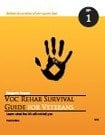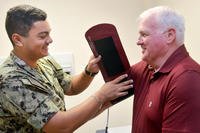Over the next month, we’re going to go in-depth into the mystery world of VA to file disability claims with the Dept. of Veterans Affairs and winning. If you don’t know yet, this kind of information is vital. We’ll start this week with the Art of Not Surprise.
One of the biggest problems with the current VA Compensation and Pension system is that they provide you with no roadmap to prove your disability claim. They know that’s a problem but they refuse take the necessary steps to fix it. Knowing this won't change anytime soon, veterans like me, who have gone through this process, choose to blog, create forums, and write guides.
It's all about being proactive so that no deserving veteran will be left behind.
First “Must Do” for Disability Claim Winning
1. Document every communication. The reason I have this first is because it is really the only way you can CYA when it comes to claims.
For example, I have had a pending claim for 18 months. This summer, I took a trip back to the Midwest from Oregon to move. Prior to my trip, I told the VA I would be out of town for 45 days – sent VA a fax and told them this fact in person at the Regional Office. I also told my Veteran Service Officer (VSO).
A few days after driving back to the Midwest, VA contacted me to tell me they were kind enough to expect me back in Oregon for a Compensation evaluation and refused to schedule it in Chicago. Then they claimed I refused my appointment and tried to end my claim without an evaluation. 18 months down the drain.
Luckily, I did keep the fax and documented the conversations I had with the VA where they claimed I refused to cooperate. Once that happened, we were able to get it sorted out. While I’m still waiting for the appointment, VA decided to not ignore my right to an evaluation.
Shocker. What I’m about to say may shock you if you’ve been hiding under a rock. The Department of Veterans Affairs has been known to ignore the law when it comes to disability claims. It’s true. This ranges from simple violations of due process to all out Shreddergate style destruction of veteran files.
Things like this give me a firm case of “not surprise.”
Yes. When it comes to the VA, they sometimes ignore the law. Knowing this is true and expecting issues relating to violations of your rights should not shock anyone. Now that you're aware, here's how to prepare.
Your take away. Document everything.
- If it’s a phone call, ask for the name of the operator and reference number of the call.
- For paper records, buy a two tab classification folder from Office Depot or somewhere similar.
- Get a hole punch. For around $30 you can purchase the tools to document your case pretty well.
- Create a spreadsheet for calls and meetings with VA officials that will allow you to track all communications in all forms.
- Send correspondence by mail using Certified Mail with Return Receipt.
Next time, we’ll talk about the VA National Call Center and how to talk to these pranksters. Veterans who have had bad experiences with their Regional Office can take a survey to rate your VA Regional Office on DisabledVeterans.ORG.
Until next time, good luck.
FACT CHECKER
Update: People wishing to dispute whether or not the VA makes legally unsound decisions should review Supreme Court Justice Roberts comments on the matter from 2010. Over 70% of all successful veterans' appeals cases are awarded EAJA fees. This means the Department of Veterans Affairs took a position that was "substantially unjustified." Here is the excerpt from The Legal Times:
"“If it's 42 percent, that's quite a high number of cases in which the government's position is found substantially -- not substantially justified as well as legally erroneous,” Leach said. “In veterans cases, it's even worse.The U.S. Court of Appeals for Veterans Claims, which reports the number of EAJA awards granted annually, reported that for 2008 and 2009, he said, 70 percent resulted in fee awards, Leach told the justices.
When Assistant to the Solicitor General Anthony Yang got up for his rebuttal in the case, Roberts interrupted him and the exchange went like this:
ROBERTS: Counsel do you -- do you dispute your friend's statement that 42 percent of the time in Social Security cases the government's position is unjustified, and 70 percent of the time in veterans' cases?
YANG: Well, I think that reflects the stakes often, Your Honor. Oftentimes the government does not contest, for instance, the $2,000 EAJA award and because it's the government, has to -
ROBERTS: So whenever it really makes a difference, 70 percent of the time the government's position is substantially unjustified?
YANG: In cases in the VA context , the number's not quite that large, but is a substantial number of cases at the court of appeals -
ROBERTS: What number would you accept?
YANG: It was, I believe in the order of either 50 or maybe slightly more than 50 percent. It might be 60. But the number is substantial that you get a reversal, and in almost all of those cases EAJA -
ROBERTS: Well that's really startling, isn't it? In litigating with veterans, the government more often than not takes a position that is substantially unjustified?
YANG: It is an unfortunate number, Your Honor. And it is -- it's accurate.
Bart Stichman, co-executive director of the National Veterans Legal Services Program, said he thinks the percentage is greater than the government’s number.“That means the quality of decisionmaking at the Board of Veterans Appeals is not very good,” he said. “We’ve been saying that for years. The number means not only did they wrongly decide the case but their position wasn’t substantially justified. Not too good.”
# # # # #
 Benjamin Krause is an award winning investigative journalist, attorney, and disabled veteran of the US Air Force, where he served in its Special Operations Command. He wrote his guide, the Voc Rehab Survival Guide for Veterans, after winning his long fight for benefits against VA to help other veterans do the same. Benjamin is a graduate of Northwestern University and the University of Minnesota Law School using VA Vocational Rehabilitation.
Benjamin Krause is an award winning investigative journalist, attorney, and disabled veteran of the US Air Force, where he served in its Special Operations Command. He wrote his guide, the Voc Rehab Survival Guide for Veterans, after winning his long fight for benefits against VA to help other veterans do the same. Benjamin is a graduate of Northwestern University and the University of Minnesota Law School using VA Vocational Rehabilitation.



